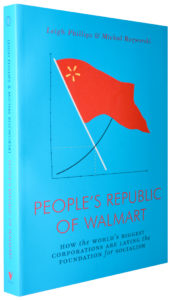 My first book, The People’s Republic of Walmart, co-authored with Leigh Phillips, was published by Verso Book in March 2019. It’s a fast-paced, sometimes cheeky, but hopefully still serious, (re)introduction to economic planning from the left. We use case studies to show how capitalism is already full of large-scale central planning, from large corporations to the financial system to the welfare state, and to bring the abstract-sounding “Socialist Calculation Debate” down to human scale. We argue that the left shouldn’t be afraid to talk about planning again, but that our vision needs to be very different: one that puts economic democracy front and centre.
My first book, The People’s Republic of Walmart, co-authored with Leigh Phillips, was published by Verso Book in March 2019. It’s a fast-paced, sometimes cheeky, but hopefully still serious, (re)introduction to economic planning from the left. We use case studies to show how capitalism is already full of large-scale central planning, from large corporations to the financial system to the welfare state, and to bring the abstract-sounding “Socialist Calculation Debate” down to human scale. We argue that the left shouldn’t be afraid to talk about planning again, but that our vision needs to be very different: one that puts economic democracy front and centre.
Here’s what the publisher says:
“Since the demise of the USSR, the mantle of the largest planned economies in the world has been taken up by the likes of Walmart, Amazon and other multinational corporations
For the left and the right, major multinational companies are held up as the ultimate expressions of free-market capitalism. Their remarkable success appears to vindicate the old idea that modern society is too complex to be subjected to a plan. And yet, as Leigh Phillips and Michal Rozworski argue, much of the economy of the West is centrally planned at present. Not only is planning on vast scales possible, we already have it and it works. The real question is whether planning can be democratic. Can it be transformed to work for us?
An engaging, polemical romp through economic theory, computational complexity, and the history of planning, The People’s Republic of Walmart revives the conversation about how society can extend democratic decision-making to all economic matters. With the advances in information technology in recent decades and the emergence of globe-straddling collective enterprises, democratic planning in the interest of all humanity is more important and closer to attainment than ever before.”
And here’s what reviewers have said so far:
“An audacious and exciting vision. The kind of thing with the power to start a new movement…I haven’t stopped thinking about it since.”
– Cory Doctorow, author of Walkaway and Down and Out in the Magic Kingdom, in Boing Boing
“A tour de force through the history of economic planning, from the dark heart of capitalism to the self-management of workers, from the earliest agricultural civilizations to the cybersocialists of the twentieth century. Far from markets being the ahistorical basis of society, it is conscious human planning that has repeatedly been at the center of economic life. In the midst of new technologies, imminent climate change havoc, and economic stagnation, this book makes the passionate and persuasive case that democratic socialist planning is more necessary and more possible than ever before.”
– Nick Srnicek, author of Inventing the Future and Platform Capitalism
“Philips and Rozworski’s book is a timely exhortation to rethink the wisdom that markets always do it better.”
– Hettie O’Brien, New Statesman
“The book does very well the urgent job of bringing together a lot of potentially world-shaking ideas and facts that most people on the left and more widely just haven’t heard about, and does it in a popular and engaging way.”
– Ken MacLeod, author of The Corporation Wars and Cosmonaut Keep
“An impressive accomplishment … the voice and writing style are wonderfully accessible without pandering. Here countless socialist arguments are presented clearly and powerfully, and I trust that it will give many others the confidence to speak as socialists.”
– Sam Gindin, coauthor of The Making of Global Capitalism
“Fast-paced and provocative. It offers readers a refreshing perspective on today’s highly planned capitalist enterprises, and the prospect of a new form of democratic, transparent and socialist planning.”
– Ann Pettifor, Times Literary Supplement
“Apologists for modern capitalism pretend that corporations are somehow the embodiment of entrepreneurial initiative, ambition, and innovative zeal. This remarkable book proves that nothing could be further from the truth. The modern mega-corp epitomizes planning and control – to a degree unmatched in human history. Phillips and Rozworski’s political conclusion is both timely and utterly subversive: if humans can construct large bureaucracies that ruthlessly maximize private profit, then clearly we can also construct large, efficient organizations that just as ruthlessly maximize human and environmental well-being.”
– Jim Stanford, Ph.D., Economist and Director, Centre for Future Work, Sydney, Australia